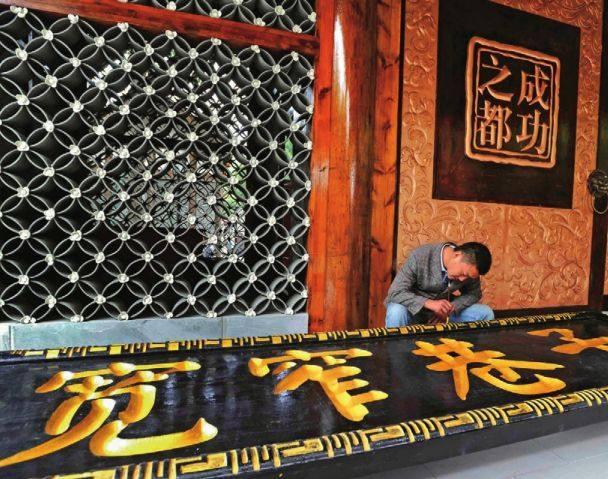Can do! Chengdu!
By staff reporter JIAO FENG
CHENGDU can do!” exclaimed Ge Jun, managing director of Intel China, when he witnessed the one billionth chip roll off the production line at the companys Chengdu plant in January 2012. Now, his words have become the tagline of Chengdus promotional ads.
From June 6 to 8, the southwestern city hosted the 2013 Fortune Global Forum, the fourth Chinese city to be honored as such following Shanghai, Hong Kong and Beijing. More than 600 political and business leaders from all over the world participated, attending discussions focusing on the “Chinese century,” “sustainable development,” “innovation and science and technology,” and “global finance and economic recovery.”
The forum became a platform for Chinas western provinces, represented by Chengdu, to demonstrate to the world the regions potential to shape the countrys future. The area is emerging as the new engine of Chinas economic growth, a new frontier full of promise.
Why Chengdu?
When the Fortune Forum first came to China in 1999, the Western Development Drive was only a blueprint. When the Forum reappeared in Chengdu 14 years later, the drive was in full force, dramatically changing the economic landscape of western China. As Fortune Managing Director Andy Serwer explained, from Europe to Asia and from Barcelona to Beijing, the Fortune Forum has been choosing host cities by looking at the context of global economic situations.
“The forum chose Chinas western inland more than it chose Chengdu,” remarked the citys deputy mayor, Fu Yonglin. Last year Chengdus GDP exceeded RMB 800 billion, and 238 of the worlds top 500 companies set up operations in the city.
According to Serwer, the forums touchdown in a western city signifies three ongoing socioeconomic trends in the Asian power: continuing growth of western provinces, urbanization (which has seen the most remarkable progress in western provinces), and economic restructuring, in which the western region is playing a critical role.
As transnational and domestic companies alike continue moving factories to the western heartland, a flood of IT and automobile manufacturers, both manual and hi-tech intensive, have settled in Chengdu. The city is now the source of two thirds of the worlds tablet computers and half of microchips in high-end laptops sold globally.
Motorola set up a research and development center in Chengdu in 2001, which, according to Jiang Hao, president and country manager of Motorola Solutions, China, is part of the companys long-term strategy to tap the western market. Today, the facility has become a significant cog in the companys R&D mechanism.
Other electronic titans have also founded R&D centers in the city, including Nokia, Ericsson, Microsoft and Intel.
Chang Won-kie, president of Samsung Greater China, revealed that his company is steering its business core from the eastern coast to the western inlands, and Chengdu, a regional hub of the West, is a key investment destination for Samsung. Local operation is expected to cover a broad scope, including finance, medical care and other service industries.
Meanwhile, Chengdu has built a complete chain in auto industry that extends from research and development to manufacturing, marketing and other trades. It is the largest distribution center for auto vehicles and parts in western China.
Earlier this year, Volvos first Chinese manufacturing plant, established three years ago, began production in Chengdu, and Volvos first China-made model S60L is set to roll off the assembly line in large-scale by October. “We are planning to build a logistics center, a Volvo museum, a brand experience center and a training facility as well,” said Hakan Samuelsson, the groups president & CEO.
One of Chengdus goals is to become Chinas Silicon Valley. According to Li Changhong, deputy chief of the citys Economy and Informatization Commission, mainstream businesses in the local software and IT service industry brought in revenue topping RMB 170.15 billion, the most among all cities in central and western China. Alex Atzberger, senior vice president of SAP AG, headquartered in Walldorf, Germany, believes that the central government is promoting the Western Development Drive, and Chengdu can become a national hub of mobile technology and cloud computing.
Forum Brings Fresh Publicity
The success of the 2013 Fortune Global Forum won Chengdu fresh praise in the media as well as from industry leaders and government officials from around the world. One fan was Time Warner Chairman and CEO Jeffrey Bewkes, who raved about Chengdu as an ideal cosmopolis.
An article in Singapore-based newspaper United Morning Post remarked that the host city of the Fortune Forum is not necessarily the most economically developed, yet hands down the most innovative and spirited. This is how Chengdu qualified to become the first western Chinese city to host the prestigious event in global business circles.
A report on the Time magazine website also pointed out that 12 of the worlds top 500 companies are headquartered in the city famed for chubby giant pandas, spicy food and a care-free lifestyle.
The forum not only boosted Chengdus economy but also its prestige. The three-day event helped seal 74 inbound investment deals with transnational companies, many on the world top 500 list, with total worth topping RMB 110 billion.
For local businesspeople like Liu Yonghao, board chairman of New Hope Group, Chinas largest animal feed producer, the forum is about much more than business. “Before the forum, it was difficult for a local executive to meet a peer from a Fortune Global 500 company,” Liu said. “We had to fly to Beijing, Shanghai or New York. But yesterday, I held talks with seven or eight leaders of global 500 companies here in Chengdu.” Liu believes that the forum brought the city and Chinese companies closer to the world.
“Chengdu, an open metropolis, is stepping into the world arena with a new image, and playing an increasingly significant role in global industry,” proclaimed Chengdu Mayor Ge Honglin. “It is a window into China for people abroad and also a window through which Chinese people can learn from the rest of the world.”

